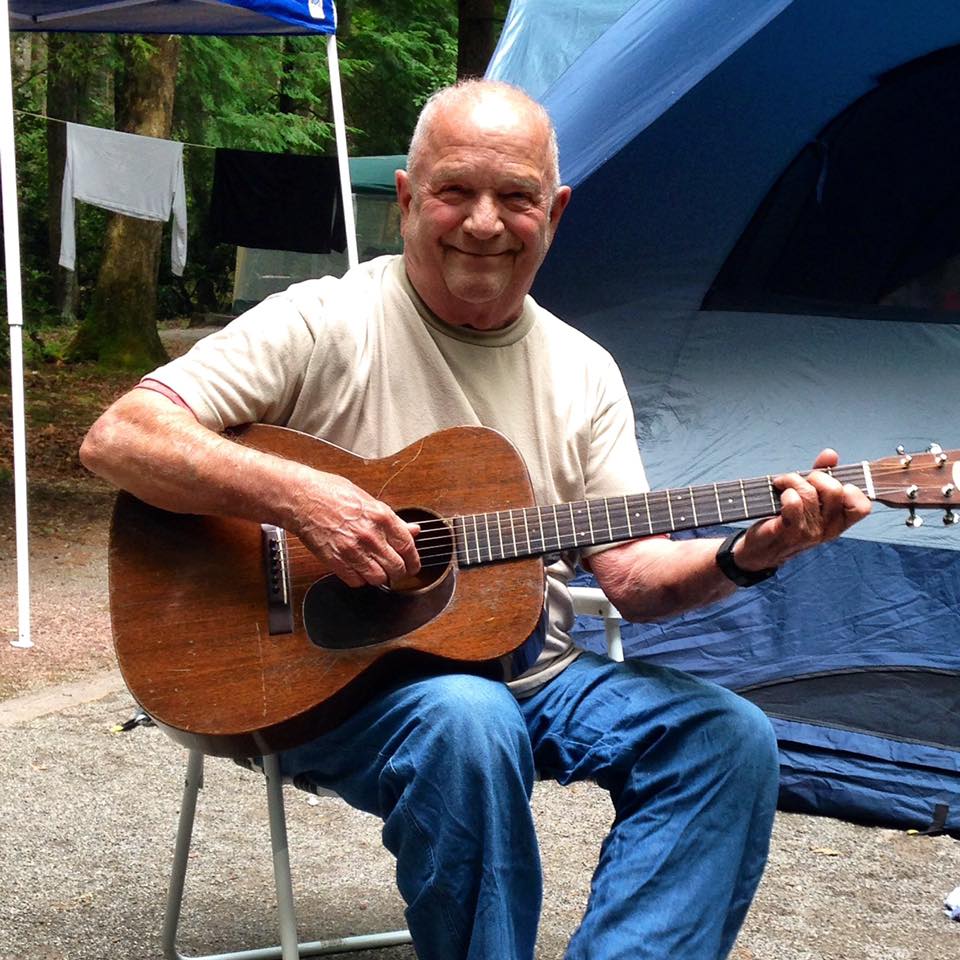
Alan made a recording in 1965 of himself singing and playing guitar, and it included not only his own compositions but these other songs written by others.

Alan made a recording in 1965 of himself singing and playing guitar, and it included not only his own compositions but these other songs written by others.
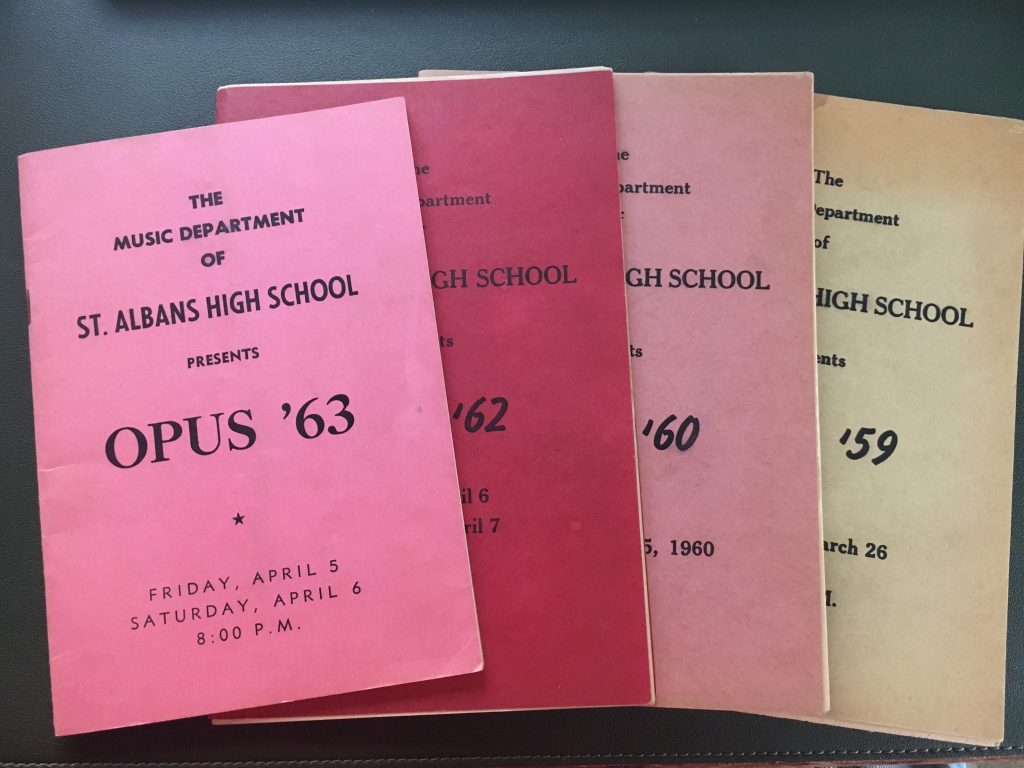
The same year that I started as band director at SAHS and wrote the alma mater — 1955-56 — I was on a roll, and began writing lyrics to fight songs. I wrote the words “Go Red Dragons, go all the way” which I understand is still being sung at SAHS athletic events.
In January 1956, the school principal (Basil Liggett (an excellent school leader whom I admired greatly), advised me that the band had bene invited to attend the annual Cherry Blossom Festival in April in Washington, D.C.
I was flabbergasted. The band was barely scraping by, virtually without funds. Such an event would be costly, and it was left to me to find a way to pay for the trip.
Along with a few donations and fund raiser, I decided we would produce a music show with Proceeds targeted for the costs of the Washington trip. And we did. And we named the show “OPUS 56”. That was the first Opus, and the trip to Washington became a reality.
It only followed that the success of OPUS 56 would lead to “OPUS 57” and so on until I left St. Albans for a teaching position in Virginia in 1963. I’ll not soon forget the richly rewarding years I taught music at SAHS; it remains a treat to meet socially with former students and friends from those times.
Alan brought OPUS to Andrew Lewis High School in Salem, VA in 1964, where he taught until 1968. OPUS continued under Dennis Reaser, a St. Albans HS student, and later friend and colleague, who followed in Alan’s footsteps at Andrew Lewis HS.
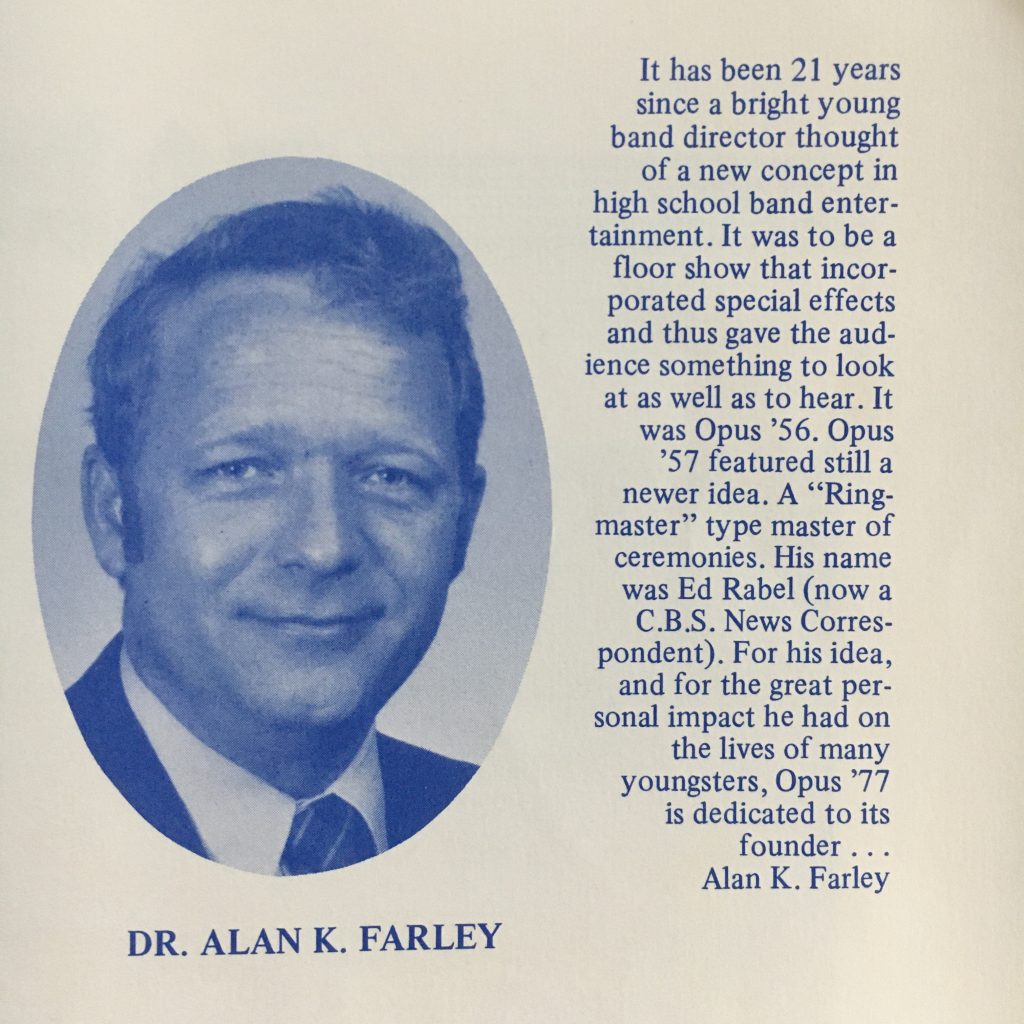
Andrew Lewis HS was merged with Glenvar HS in 1977 to form Salem High School, where OPUS continued under Dennis’s direction for many years. The 1977 Opus was dedicated to Alan. It was alive and well through about 2013-2014.
As of this writing, we are trying to determine just how long OPUS continued at St. Albans High School.
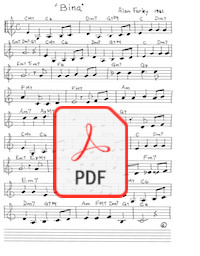
I wrote this little romance song for Carol, and used the piano in the music department, since we didn’t have one at home. “Bina” is how Carol pronounced her middle name “Lavinia” (La-veen-ya) as a child, and “Carol Bina” was a well-known nickname.
Unfortunately, there is no recording of this song.
I had just arrived as band director at SAHS in august 1955. I was full of energy, anxious to lead a band that would play fine music. At the time, I was living at home (age 24, in South Charleston). After a few weeks of working in my new job, it occurred to me that a school with as rich a history as St. Albans should have a “school song”. I became highly motivated to make that happen, wrote this in one afternoon, after football season). It’s still the official alma mater all these years later.
Having finished the melody and lyrics, the next job was to write choral parts, which I did.
I introduced the “new” Alma Mater late that fall, but it didn’t get performed until the following year, when I assumed the director ship of the choral music program.
I taught at St. Albans from 1955 until 1963, a time I will never forget.
That same year — 1955-56 — I was on a roll, and began writing lyrics to fight songs. I wrote the words “Go Red Dragons, go all the way” which I understand is still being sung at SAHS athletic events.
In January 1956, the school principal (Basil Liggett (an excellent school leader whom I admired greatly), advised me that the band had bene invited to attend the annual Cherry Blossom Festival in April in Washington, D.C.
I was flabbergasted. The band was barely scraping by, virtually without funds. Such an event would be costly, and it was left to me to find a way to pay for the trip.
along with a few donations and fudn raiser, I decided we would produc a music show with Proceeds targeted for the costs of the Washington trip. And we did. And we named the show “OPUS 56”. That was the first Opus, and the trip to Washington became a reality.
It only followed that the success of Opus 56 would lead to “OPUS 57” and so on until I left St. Ablans for a teaching position in Virginia in 1963. I’ll not soon forget the richly rewarding years I taught music at SAHS; it remains a treat to meet socially with former students and friends from those times.
If anyone knows of an online recording of the Alma Mater (the more official the better), please send us the link via our Contact form. Thank you!
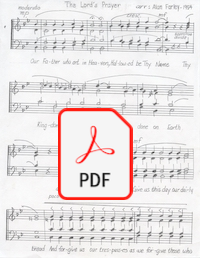
This arrangement of The Lord’s Prayer was composed in 1954 for performance as part of the Orthodox Liturgy/Service at St. George Orthodox Church in Charleston, WV. The regular Sunday service, which was performed by the priest and cantors, was interspersed with musical responses and liturgy by the choir. The Lord’s Prayer, performed at every service, was sung by the choir, with the final lines being sung/chanted by the priest. (Note: it is my understanding that the final words “For Thou art the Kingdom, the Power, and the Glory Forever and Ever” are not included in the Roman Catholic or Orthodox congregations’ recitations of The Lord’s Prayer, but rather are stated by the attending priest.)
The music being performed at that time — and in that Church — was from the Russian, sung in English. Accordingly, I attempted to give this arrangement a reasonable Russian flavor in keeping with the rest of the “Sunday music.” Notably, the church membership was primarily Syrian/Lebanese, as Charleston had a sizable Lebanese community. The priest at that time, Father Raphael Husson, was Lebanese. Nevertheless, the Russian music was in place when I arrived as choir director, and it was/is indeed quite beautiful.
As an integral part of the service, the Lord’s Prayer was performed in straightforward manner, without repetitions of words or music. Indeed, this version may be inappropriate as a regular Protestant-type anthem (partly due to its brevity), but could perhaps be performed to serve some other special occasion.
I write this for those who are interested in ancestry . . . as I have become in recent times, motivated in great part by Leslie’s work with our family history. When I was much younger I didn’t give it much thought, and that’s probably the way most people are.
There were times, though, that I wondered about my ancestors: I knew who they were, birth and death dates, etc., but I didn’t know much else — what they did in life, their personalities, how they viewed the world, and the rest. Simple data such as one would find in old documents and photo leaves a lot to the imagination. And I have regretted not knowing more about their personalities, lifestyles and family connections.
Someday, when my grandchildren and their children and those beyond are mature adults, they may wonder about the early generations of family. In that interest, here are memories and impressions of those of whom my own children know very little. I leave it to my kids and their kids to pass along to later generations of the family their impressions of their grandparents and myself and Carol.
What follows is a narrative of my memories of those who were the eldest in my family when I was a small child. Since the eldest of these date back to the time of the Civil War, I thought it might be of interest to my descendants who know of that time only through history books, film documentaries and the rest. Actually, there’s not a lot to write about, but it’s much more than the scant letters and other documents of my forebears that I have been able to see.
I should have started this long ago, so that Alice and Dave could have contributed. As it is, these words are slanted by who I am, so they may be short on accuracy. But in fact, I believe not. I had talked with Alice and Dave about our forebears enough to know that we were “in sync” regarding our collective memories of these ancestors. Here, then, are my best recollections of people I wish you could know today. I’ll begin with those ancestors who came first in time: my two great-grandmothers.
It’s fair to say I’m a lifelong Democrat. But I don’t know anyone who is 100% either Dem or Repub. But I’m surely about 90% Dem. Some scientists suggest that we may be hard-wired to be either left or right-leaning. I suspect that’s true. I grew up in a UMW, AFL, CIO, AFM household, where my Dad would hold forth at the supper table. First about his heroes FDR and Truman; and then THE foes: Ike, Nixon, Reagan and the rest of the righties. He was even more heated about the Republicans in local and state government. So I got the full dose as a kid, and I’m sure it served to reinforce my left-of-center views, which I maintain I’m wired for. I don’t have a choice — I was born to be liberal. And even if I had a choice, I’d still be a liberal.
I won’t belabor this topic. Instead, I’ll enumerate a few events that got me going:
I guess you get the picture here. There have been many Republicans I have admired, including Senators Jacob Javitz and Everett Dirkson, Dick Lugar, Charles Percy, Lincoln Chaffee and others. By today’s Republicans, they would be called “RINOs” — Republicans In Name Only, a term conjured up by far-right Republicans. And there have been many Democrats I didn’t admire: Matthew Neely, Ben Nelson, Joe Manchin, and Evan Bayh, to name a few.
My heroes are Harry Truman, Hubert Humphrey, FDR, JFK, Barack Obama, John Adams, Abe Lincoln, to name a few. Some say, and I agree, that FDR was the greatest president of the twentieth Century. Others would rewrite history, creating a false narrative of events to suit their wrong-headed sense of what happened and what didn’t.
One of many hot topics today is Women’s Rights. I can’t say strongly enough how much I support programs and legislation that for once and for all make things right in this regard. It is criminal that women today, in our “enlightened” society, still suffer significantly with regard to basic human fairness. They — not the men of Congress, should make basic decisions regarding their own bodies.
Likewise, I am appalled at the continuing mean-spirited bias — often in the name of religion — against LGBT people. They should have the same rights as everyone else, and beyond their legal rights, their lifestyles should be respected, but that will be a long time coming A final words about health care, which along with environmental issues, is the most politically explosive domestic matter in America since Harry Truman’s time: I don’t believe that human health and suffering should be the source of profit for anyone. I do believe that those who provide for human health (not only the caregivers; include those in research, production of health products, etc.) should be extremely well-compensated, for their work is one of great dedication, and requires great skill and training. But it seems to me that if hospitals, insurance companies, research labs, and other health institutions operated on a not-for-profit basis, every American could receive low-cost health care. There’s plenty of profit to go around in other small and large commercial-industrial enterprises. Such a program would remove the poisonous stinger that causes great national pain and anguish — politically, financially, physically, mentally, and economically. And it would remove the personal pain and anguish that people suffer from, being financially choked by a health system that has no conscience. And besides, it’s just the right thing to do.
This is a short piece which reflects on my favorite “stuff.” It would probably change if I did it again, so don’t attach a lot of finality to my thoughts. It’s meant to give grandchildren and their children a window into the family’s past. I’m sure my own kids have already heard me talk about all this stuff.
I didn’t pay much attention to my family history until I was about 70. By then most of it was lost; and most of what was left was oral. But my mother and Dad make a couple of cassette tapes in the late 1970s which were great to listen to. So I thought I’d pass this along as a kind of snapshot of who old man Alan was.
As I write this and review it, I’ll probably edit/update a lot of stuff. Especially with music; there’s so much of it, and so much unremembered that I wish I could mention.
Here goes:
Finally: These are but a few favorites; believe me, there are many, many more that I could include, but you get the picture.
Too many to list, but here are a few:
Hard to pick favorites here, but I’m partial to early country songs and artists:
Broadway shows that I worked in as music director: Oklahoma — my very favorite; South Pacific, The King and I, Annie Get Your Gun, and Carousel were my picks.
Just to name a few: Gershwin, Cole Porter, Irving Berlin, Duke Ellington
Love it. From the formal dance forms — tango, rumba, etc. to Caribbean, it’s good. Brazilian jazz is terrific.
Music that’s anything but favorite: each to his/her own taste. I don’t like or enjoy
I’m attached to older movies, too. Classic movies of the 30s and 40s, especially.
I won’t name but a few favorites: Casablanca, Midway, Star Wars 1 — yeah, that too — Red River, Roadhouse (Widmark and Lupino), Music for Millions, Johnny Belinda, Key Largo, Indiana Jones stuff, The Ring Trilogy (Amazing!), The American President, Dune, Once Upon A Time In The West
Movie stars: Charles Laughton, Humphrey Bogart (!!!), John Wayne, Richard Widmark, Cary Grant, Sean Connery, Harrison Ford, Robert Mitchum, Henry Fonda, Ida Lupino, Jane Wyman, Claudette Colbert, Carole Lombard, Bette Davis, Katharine Hepburn, Susan Hayward, Lauren Bacall
No surprises here: Patrick O’Brien’s series of naval adventures with Captain Jack Aubrey. Hands down the favorites. Then some more real favorites: Tolkien’s Hobbit books; all of them, along with Silmarilian, and others. Followed by the Dune series of five great science fiction novels by Frank Herbert. Also: the Bourne books by Robert Ludlum. And, of course, the wonderful books by Louis l’Amour, which tell the same tale over and over again, with beautiful descriptions of the western landscape. Yeah, I know, they’re simple, but that’s what makes them special.
Other favorite books: The Iliad, Huck Finn, Tom Sawyer, all of A.B. Guthrie Jr’s Western trilogy: The Big Sky, The Way West, Fair Fair Land. All of Robert Ruark, and most important, all of William Faulkner. Seems I drift toward books in series, huh.
I read about 100 books a year, so there are a lot of authors that are really good, but not mentioned here — maybe later.
When I was a kid we never had a car at home. I figured my Dad could drive, but we just didn’t have one, and I never asked him or myself why. When I finished high school and enrolled at Morris Harvey College, I rode the local transit company’s buses for four years. But even then, I didn’t wonder about why we had no car in the family. We just didn’t.
So I finished college without even thinking about having to own a car. Then reality struck. I was offered a teaching job (music) where I’d have to teach kids in ten elementary schools, plus my “real job,” directing two junior high bands. With only a couple of weeks to do the car deal, I was recommended by a musician friend to the local Ford dealer. We came to an agreement on a 1953 Ford Fairlane for $2,100. That’s when the fun began.
I went to see my grandfather (Granddad Henry Hale), who was a retired coal miner. His miner’s pension was $50.00 a month. I told him about the teaching deal and the Ford, and asked him if he could loan me the down payment: $500! We were sitting on his little front porch, where he always sat while chewing Favorite Chewing Tobacco. He spat and said he’d be right back.
He went into the house, leaving me wondering what was up. He returned, sat down and showed me his money belt — which no one knew about. It was like a cartridge belt — snap-close leather pouches all the way around. He fished into a couple of pouches, and produced five hundred dollars, which he handed to me.
Then he said to wait a minute. He pulled a pencil and a scrap of paper from his shirt pocket, and wrote on it: IOU Henry Hale $500, signed: Alan Farley. I signed the note — smiling to myself — and promised I’d pay him back as soon as possible. With a teaching salary of $280 per month for ten months, that was a heavy debt.
I then went to the Ford dealership with my $500. We signed papers for three year financing, and then the salesman gave the keys and said “the car is yours.” He pointed to the Ford Fairlane which sat on the showroom floor. It was only then that I knew that I had to drive that car home, and that I did not, had not, had no license to drive. Had never driven.
Without making much of it, I took the keys as though I were an old hand, got in the car while they opened the wide glass drive-in entrance through which display cars were moved. Gulp. I knew I’d have to fake it and drive home, but I hadn’t counted on taking that car out of the showroom.
Somehow, I made it out of the showroom on onto the street.
That’s about it. I drove without a license for a few days, avoiding main-traveled roads. Then I went to the State Police barracks where they conducted behind-the-wheel tests for issuing drivers’ licenses. (There was no written test at that time.) The sergeant got in the car with me, gave me the test, which I passed. Then he asked, “How did you get here to take this test?” “Well, I drove this car.” “You drove this car to the State Police barracks without a driver’s license?” I turned red. “Just kiddin’,” he said.
A little more than a year later, I went to my grandparents’ home and told granddad that I had the final payment on the $500 loan. He said, OK. I gave him the money and he reached in his pocket and produced the original IOU.
Then he said, “You’re thirty dollars short. Six percent interest is thirty dollars.”
I wrote him a check for the additional thirty dollars, knowing that he was just teaching me a lesson about money. He chewed, spat, and laughed. And I laughed with him.
I literally drove the wheels off that Ford. My teaching duties required a lot of travel, and, being the proud owner of a CAR, I drove it everywhere. Kenny and I hung out in the evenings at the local drive-in (Parkette, later to become Shoney’s), and so on. We would sit in the car, order a grilled cheese and coffee — about thirty-five cents, and he with his uke, I with my Martin, would pick and sing, drink coffee, wave at regulars, and just have a big old time. So my Ford gathered a lot of miles in less than three years — about 95,000. And it was time to trade. You have to understand that cars in those days were built to last for only three years — planned obsolescence, they say, and my Ford was about worn out.
Kenny was in school at the time at the University of Cincinnati, studying mechanical engineering. He was on a work-study program where he’d go to school for seven weeks and come home to his job with the State Road Department for the next seven weeks. So although he was in school, we saw each other often, and car talk was part of the deal. Kenny got going about British sports cars, and I latched on. I wound up at the local foreign car dealership and traded the worn-out Ford for a 1956 MGA Roadster.
Amazing!! It was the first year for that model, and it was a truly wow-level car. A short time later, Kenny bought a used Austin Healey — red — and we had many two-car rallies up and down the mountain roads around Charleston. What a time.
At that time I was still playing bari sax in a local big dance band. Of course, the sax wouldn’t fit in the MG boot, so it rode up front in the passenger seat. Kinda cramped my style, actually. . . I couldn’t take anyone with me to a dance job, or “gig,” as we called it.
The MG cost $2,800 new. That was a lot back then. As my second car, it was a truly neat driving experience. We were a sporty pair, and had great fun wheeling around West Virginia, which is a wonderful driving range for imported sport roadsters. We even wore the classic British caps — hot stuff.
I — we — drove the MG until after Carol and I were married, and traded it for spiffy Alfa Romeo Spyder. Then Carol got pregnant, so we went for a used ’55 Chevy just before Patrick was born. Obviously there would be no room for Carol and me and Patrick in that Alpha. No regrets; as much fun as the roadsters were, Patrick became the center of our universe until we had Leslie three years later, and Amy a few years later. Our universe simply expanded.
| Carol driving the Alpha Romeo in a SAHS Homecoming Parade |
The Ford was special, as my first car. The MG moved the bar. Fifteen or so cars later, they bring a good feeling. But I do go on.
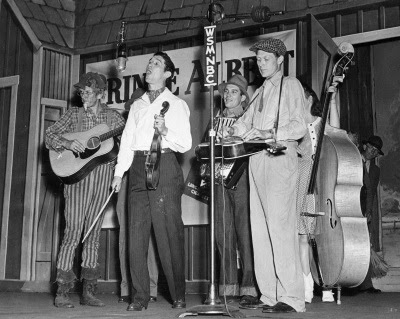
I was ten, I think. I had, during the previous several months, become addicted to hillbilly music, as it was called then. I had been kept home from school with a sore throat that wouldn’t go away, so during the long afternoons I would listen to local radio — AM only, of course, and country music was the fare. That led to my discovery of The Grand Ole Opry on Saturday nights, so I soaked it up. The sound of a mandolin really got me. Banjo, fiddle, all the rest. I listened from 7:30 until the final show closed at 11:00. That final show was a thirty-minute segment featuring Roy Acuff and the Smokey Mountain Boys. He was famous at the time, and had several big hits to his credit. They billed him as “The King of Country Music.”
I could go on and on about the Opry, but this is a more narrow story. It’s about Roy.
The ad hit the Charleston Gazette: Roy Acuff was coming to town, to the Municipal Auditorium, on a Sunday afternoon, in just three weeks. I whooped. Asked Mom if I could go; told her I had saved enough — well, almost enough, to buy a ticket. She said that wouldn’t work, she didn’t think I should go all the way to Charleston on the bus by myself. I begged. I pleaded. Finally she said OK. (I think she intended all along to go for it; she just wanted to impress on me the importance of taking care of myself.) So, along with the few cents I had, I saved enough for the ticket, with a dime to spare. I think the ticket was either 50 cents or a dollar, don’t remember which.
That Sunday, I dressed in my best green sweater, caught the bus. Bus driver looked at me, a small kid, asked where I was going. Puffed up, I told him “Municipal Auditorium.” I sat right behind him, looking out all the closest windows. He said “Here we are,” I got off in front of this monstrous building with all these people out front, and momentarily froze. Then I got my nerve up, bought a ticket and went inside. A cavern. Dark, huge. I found my way to the top, where there weren’t any people. I moved down two or three rows and got my seat. There was no one even close. I waited and waited, then finally the curtain went up and the show started.
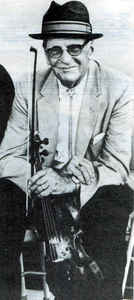
The first act on the show was a fiddle contest. There were two “finalists.” The first was a country guy called Natchez the Indian. Evidently, he was famous and traveled with the show. His competitor was a local man named Clark Kessinger. The crowd roared at his introduction. Someone could write a short story about that fiddle contest. I’ll keep it simple. Natchez went on first. He played an old-time hoe down, and everyone clapped. Then he did his big number: “Listen to The Mocking Bird.” He made his fiddle sing. Pretty bird songs, nice fiddling in between. Up the fingerboard, back down. Tremelo, acrobatic stuff. I was entranced. When he finished he received a huge applause from the crowd.
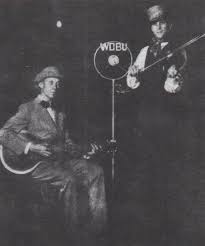
Then Clark Kessinger stepped up. While Natchez had come out in a fancy costume with spangles and a wide hat, Clark stepped up to the microphone in black trousers, white dress shirt, no hat. He proceeded to play his regular fiddle tune, matching Natchez with fast-flying bow work, all over his fiddle. The audience yelled its approval. Then Clark stepped to the mike and said something like this: “Natchez is a fine player. But he played ‘Listen to The Mocking Bird,’ which I had planned as my feature song. So if you all don’t mind, I’ll go ahead and give you my version.”
And he did. He not only played the sweetest, various bird songs, interspersed with a fiddle version of the song, he then put the fiddle behind his neck and continued to play. Then the fiddle went behind his back. The crowd roared. By that time I was transfixed. Finally, he took the bow, placed it between his knees facing forward, and played by moving the fiddle upside down, back and forth. That did it. The crowd rose to their feet, Clark took a portly bow and walked off stage. Of course he was named the winner of the fiddle contest. By that time I was in a trance.
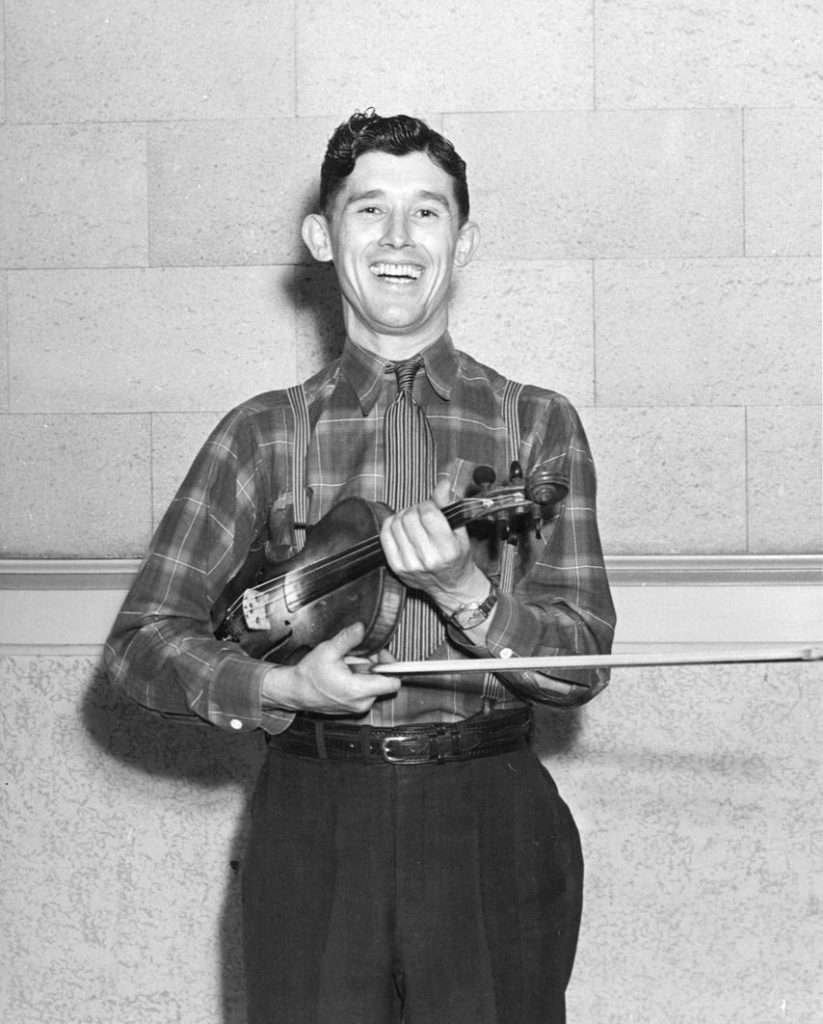
And then: then, the show started. Out came Roy Acuff himself (also in dress pants and white dress shirt — none of that cowboy stuff — and the music began. The Smoky Mountain Boys played and sang all the familiar hits that I’d been listening to on the Grand Ole Opry. I can name the songs, the band members, the comedy, all of it. But that’s not important here.
I simply can’t tell you how I felt that day. I suppose “magic” fits. That I can tell you about it now, some seventy years later, may help you see me, young, green sweater, with a dime left over, going to Charleston alone, seeing and hearing all that music, forever tied to that kind of music. As it turned out, not just that kind of music. That was in fact my first “live” music experience. While I loved listening to the radio, the live experience made sense of it all. Music is music, in the end. Roy helped me understand that. Note: It turned out that Clark Kessinger lived in South Charleston. I went to high school with his son and daughter. Clark was locally famous, and in his later years won national championships for senior fiddlers. I have many of his recordings. Look him up.